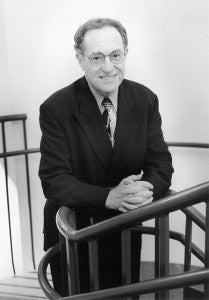The following commentary is excerpted from the New York Times blog, Room for Debate:
Judge Sonia Sotomayor in confirmation hearings this week explained (many times) what she meant by her “wise Latina” remark, defended herself against charges of being a bully on the bench, and tried to navigate carefully through discussions about abortion and gun control. She strove to be as circumspect about her views as possible, while the Senate Judiciary Committee members played their preset roles as defenders and interrogators.
The New York Times asked some legal scholars and others who’ve been following the hearings what’s the most interesting thing they’ve learned. And if the hearings have revealed nothing new about Judge Sotomayor or her questioners, do they still hold some other kind of value?
Here, Harvard Law School Professors Alan Dershowitz and Charles Fried and Lecturer on Law Tom Goldstein offer their answers to that question.
Dershowitz: Posturing and Hypocrisy

For the most part confirmation hearings for Supreme Court Justices bring out the worst in the senators and in the nominee. The Sotomayor hearings are worse than most. Senators pretend to be outraged by the thought that a judge might be influenced by ethnicity, gender, religion, political affiliation or other such factors. The nominee pretends that she misspoke, or was misunderstood, when she acknowledged, in a moment of candor, that her Latina background might put her in a better position to understand certain legal or constitutional issues.
Every practicing lawyer knows that these external factors matter — and matter a great deal. Any lingering doubt was put to rest forever by the Supreme Court’s shameful performance in Bush v. Gore, where five Republican justices voted like five Republican politicians, casting aside their own precedents and their constitutional obligation to do justice without regard to the identity of the litigants. I know of no honest lawyer who believes the case would have come out the same way had the party affiliations of the litigants been switched.
Oliver Wendell Holmes once wisely observed that the job the lawyer is to predict what the courts will do in fact. Lawyers are paid enormous sums of money to make these predictions. Among the most salient items of information a lawyer needs to predict accurately are precisely the factors that the senators and the nominee claim should make no difference in the outcome of cases.
It is precisely because these factors matter so much that it is important to have individuals from different backgrounds on the Supreme Court.
Fried: She’ll Fit In Just Fine

Judge Sotomayor has shown that she is smart, strong, experienced and knowledgeable. She should and will be confirmed.
Tom Korologos, who had been assigned by the Reagan Administration to guide me through my confirmation hearings to be solicitor general, explained to me at the time that for a nominee the purpose of a confirmation hearing is to be confirmed, not — as Judge Robert Bork evidently thought — to engage and best the senators in debate.
On the other hand, Judge Sotomayor has given no evidence that she will change the Court, which is made up of similarly able and knowledgeable people, but has been stuck — like the parties, to a long but not quite happy marriage — in endlessly repeated familiar arguments and in a depressingly predictable pattern of 5-4 splits on the most important uses before them.
Of course, any nominee who had the freshness to point the way out of that wilderness had better give no evidence of it during the hearings, and so there is always room for hope.
Goldstein: At Least, It Hasn’t Been War

Two things stood out. First, I thought that Al Franken, in his opening statement, introduced himself nicely to the public. He was very serious and cordial to his colleagues. It will be really interesting to see if he can follow through with good substantive questions.
Second, Lindsay Graham is fantastically candid. He’s honest about the conservative and liberal politics driving the process. He raises the genuine concerns conservatives have and gives Judge Sotomayor the chance to answer.
Though some objected to his own tone in discussing complaints about Judge Sotomayor’s tone on the bench, my perspective in the hearing room was that he was just flagging something he sincerely thought she would benefit from considering. And he’s consistent: his view is that elections matter, and that President Obama deserves deference, just as President Bush did.
Overall, I’m now slightly optimistic that we aren’t headed into a permanent death spiral between Democrats and Republicans with each party relentlessly attacking the other’s nominees and voting on party lines. Republican senators have behaved almost uniformly responsibly. Democrats haven’t tried to caricature Republicans and play the race card with them. If we could take a step back from the brink of the judicial wars, that would be a tremendous step forward.
